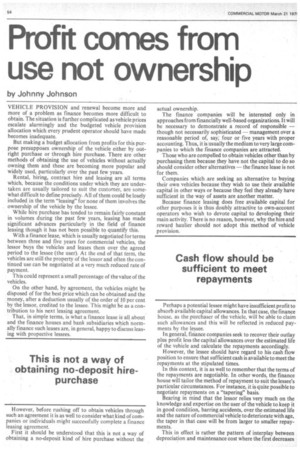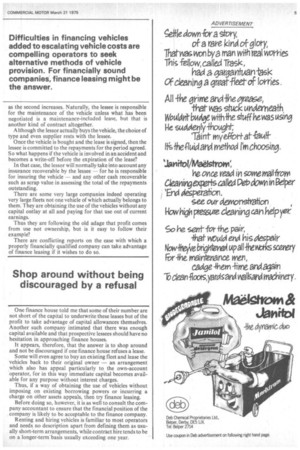Cash flow should be sufficient to meet repayments
Page 56

Page 57

If you've noticed an error in this article please click here to report it so we can fix it.
Perhaps a potential lessee might have insufficient profit to absorb available capital allowances. In that case, the finance house, as the purchaser of the vehicle, will be able to claim such allowances and this will be reflected in reduced payments by the lessee.
In general, finance companies seek to recover their outlay plus profit less the capital allowances over the estimated life of the vehicle and calculate the repayments accordingly.
However, the lessee should have regard to his cash flow position to ensure that sufficient cash is available to meet the repayments at the stipulated times.
In this context, it is as well to remember that the terms of the repayments are negotiable. In other words, the finance house will tailor the method of repayment to suit the lessee's particular circumstances. For instance, it is quite possible to negotiate repayments on a "tapering" basis.
Bearing in mind that the lessor relies very much on the knowledge and expertise on the user of the vehicle to keep it in good condition, barring accidents, over the estimated life and the nature of commercial vehicle to deteriorate with age, the taper in that case will be from larger to smaller repayments.
This in effect is rather the pattern of interplay between depreciation and maintenance cost where the first decreases as the second increases. Naturally, the lessee is responsible for the maintenance of the vehicle unless what has been negotiated is a maintenance-included lease, but that is another kind of contract altogether.
Although the lessor actually buys the vehicle, the choice of type and even supplier rests with the lessee.
Once the vehicle is bought and the lease is signed, then the lessee is committed to the repayments for the period agreed. So what happens if the vehicle is involved in an accident and becomes a write-off before the expiration of the lease?
In that case, the lessor will normallytake into account any insurance recoverable by the lessee for he is responsible for insuring the vehicle — and any other cash recoverable such as scrap value in assessing the total of the repayments outstanding.
There are some very large companies indeed operating very large fleets not one vehicle of which actually belongs to them. They are obtaining the use of the vehicles without any capital outlay at all and paying for that use out of current earnings.
Thus they are following the old adage that profit comes from use not ownership, but is it easy to follow their example?
There are conflicting reports on the ease with which a properly financially qualified company can take advantage of finance leasing if it wishes to do so.








































































































































